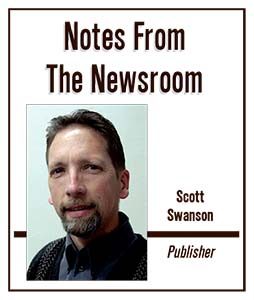A lot of legislation is on the table in Salem right now, so much that it’s almost mind-boggling to try to even identify it all, let alone give it the close attention it deserves.
In this session, which started Jan. 21 and is scheduled to end June 28, nearly 2,500 laws had been introduced by the beginning of this month, according to legiscan.com, which provides helpful tools for keeping track of what’s going on in the capitol.
There are a lot of interesting, if not concerning, bills in that mix: lock requirements for firearms, a proposed repeal of crimes related to prostitution, clarifications of the governor’s authority during emergencies, reparations for black Oregonians who can demonstrate heritage in slavery, proposed changes to criminal sentences, etc.
 There’s also one that hasn’t made a lot of headlines, but should. Because it’s one of those laws that, on its face, sounds pretty good until we work out the nitty gritty.
There’s also one that hasn’t made a lot of headlines, but should. Because it’s one of those laws that, on its face, sounds pretty good until we work out the nitty gritty.
It’s House Bill 3273, a proposal to ban the publication of the head-and-shoulders “mugshots” you see occasionally in this newspaper. It passed the House with a sweeping affirmation late last month – only four no’s, one from our own Rep. Jami Cate. It’s now in the hands of the Senate, and it needs attention – from the people of Oregon.
A public hearing on this bill was held Wednesday, May 12, in the Senate Committee On Judiciary. That committee is scheduled to have a work session on the bill May 24.
Introduced by representatives Janelle Bynum of Clackamas, Brad Witt of Clatskanie and a dozen others, the bill would prohibit law enforcement agencies from releasing booking photos of suspects who have been arrested, except in specified circumstances, like when release of a photo would “further a law enforcement purpose” such as asking the public to help identify a suspect or fugitive.
But that’s not the real focus of the law, which targets the use of mugshots on “publish for pay” websites, that download arrestees’ photos, then essentially hold them for ransom – the photo stays unless the subject pays a price to have it removed.
Yeah, really scuzzy stuff. I mean it. These websites are classic examples of taking advantage of the letter of the law to violate the spirit of the law.
It should be noted that the originators of this law also have a companion bill that targets “doxxing,” the practice of publicly revealing previously private personal information about an individual or organization, usually through the Internet. Unfortunately, mugshots are often used in doxxing attacks.
After the turmoil in Portland last year, in which doxxing was employed by individuals on various sides of the conflict, legislators have decided to do something about it.
According to testimony by Bynum, who chairs the House Committee on Judiciary, the bill is a result of an “anti-doxxing workshop” that included a wide variety of law enforcement and others who were concerned about the prevalence of the practice.
So what could possibly be wrong with cutting off these problems by a blanket ban on the release of mugshots by law enforcement? Simply this: You, the citizen, will lose a critical element of your First Amendment right to know what is going on.
Proponents of the bill argue that the publication of mugshots merely accentuate what is already a very bad day for an arrestee, escalating the pain and shame that person feels. Bynum argues that the subject can be impacted for years to come, especially in this era of social media and the internet.
I can see that. We all know that not all arrests result in convictions, and a lot of that is more public than it was before the World Wide Web came along. Some suspects, whose likenesses have appeared in the public arena, walk free. And yes, the reality that an individual has been arrested can certainly have a negative impact on his or her life down the road.
But that doesn’t change the fact that it has happened and it’s part of a process that the public needs to be very aware of. Reporting the actions of law enforcement is a healthy part of democracy. While it’s not always comfortable to know someone has been arrested for something, as a citizen do you think you should be aware of that (unless you choose not to) or be forcibly unconscious of it?
The First Amendment is not comfortable, but it’s necessary unless we want to live in the kind of society depicted in “1984” or “The Hunger Games.”
If that sounds paranoid, way out there, answer this question: Did you think, 10 years ago, that we’d be seeing what we’re seeing in society and talking about the things I’m talking about?
The First Amendment provides for freedom of speech, the press and religious activity that many of us may not particularly want to engage in and it can even be uncomfortable to see or hear others engage in it.
A march down Main Street by people protesting something, even if it is conducted without the violence and vandalism that many of us associate with protests after watching what’s happened in Portland and other communities over the past year, still has an uncomfortable element to it. It’s designed to get our attention and it does. A rally happens when people are exercised to the point that they take action, which ripples the general peace and quiet many of us value.
Seeing a mugshot of someone who has been arrested in the newspaper or on TV is not always comfortable, but what if we were unable to see the arrestee’s likeness in a photo? What if we reported that Bob Smith or Linda Brown has been arrested for, say, child molestation, and all you had was that name?
Under this proposed law, there would be no need for law enforcement officials to release the mugshot, so we would all be left wondering which Bob Smith or Linda Brown in our community that might be. We might have an age to give us a clue, but even that is sometimes a hassle to come by, I can certainly attest as a journalist.
Literally, while I was thinking about this, I actually received an email from an area Sheriff’s office about a convicted sexual predator who had been released from prison, back into the community (not this one). It included his name, address, age, hair and eye color, race, height and weight. But what I didn’t see was a photo.
Wow, if I’m a parent with young children who enjoy riding their bikes down to the park, that’s really helpful. (As it turned out, there was a photo, but it wasn’t attached in the normal way and I’d missed it.) But that illustrates the point.
What if the police decided it wasn’t necessary to their interests to let us see what this guy looked like? What if they deemed that his rights of reputation outweighed our right to public safety, which essentially is what is at stake here?
Of course, there are elements of discomfort in all this. Of course, we don’t like to see people have difficulty getting jobs or be otherwise impacted because they made a mistake and were arrested – or, worse, because the arrest occurred in error. Nobody, least of all me, likes to see someone suffer injustice in the public process, but it is a reality in the world we live in.
The fact is, mugshots are part of the public record in today’s world. I don’t fault legal steps to prohibit scam artists from holding people – innocent or guilty – hostage on these pay-to-not-play websites. But this bill is way too broad.
Why should a person’s likeness be restricted when their name and other information is not? In the end, you, the public, are the real losers.
This is taking Oregon into very dangerous territory, putting police agencies in an increased position of deciding what the public can know about what they are doing and what it cannot.
I can say that journalists are already struggling with police agencies’ increased tendencies to hold their cards closer to their vests in releasing public records. They don’t release information they once did freely, including names of suspects and arrestees, which requires us to directly request them – a time-consuming process.
As a reader, would you rather we be out there covering a nice feature story or a kids’ ballgame, or sitting at our desk trying to chase down details from reluctant police agencies that should be part of the public record?
You, the public, have the right to know what is going on in your community. This proposal would impede that. It is just a bad law.





